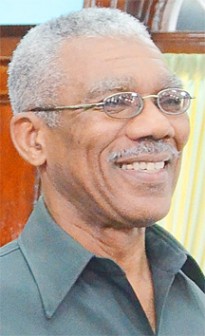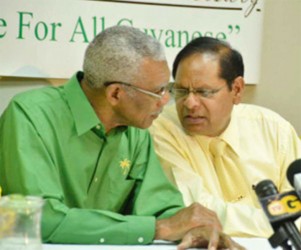Guyana Review poses key post-elections questions to APNU-AFC coalition presidential candidate David Granger
GR: Setting aside hopes of unseating the ruling PPP/C, do you see the Cummingsburg Accord and the APNU-AFC coalition as the first steps in the direction of changing the culture of ethnic voting in Guyana?
DG: The process of change in our political culture began in July 2011 with the establishment of A Partnership for National Unity – APNU – as a five-party pre-election coalition. The coming together of the Guyana Action Party, Justice For All Party, National Front Alliance, People’s National Congress Reform and Working People’s Alliance in 2011 was the biggest breakthrough in breaking down the barriers to ethnic, electoral inclusiveness. The Cummingsburg Accord is an important continuation and expansion of the process of the termination ‘winner-takes-all’ style politics and of the transformation of the culture of ethnic voting.
GR: How confident are you that the PNC/R constituency is satisfied with the political arrangements – including the power-sharing arrangements – arrived at in the Cummingsburg Accord?

DG: I am fully confident in the support of the PNCR’s main institutions – General Council and Central Executive Committee – and organs and arms – National Congress of Women, Guyana Youth and Students Movement, Regions and Districts. They accepted and adopted the practice of ‘partnership politics’ years ago with the establishment of the PNCR-1 Guyana organization and generally understand that the country’s future is more important than individual parties or personalities.
GR: The feeling among sections of the electorate is that the opposition coalition will have to offer assurances to a constituency which, hitherto, has had varied (PPP, PNC, APNU) allegiances. How confident are you that the coalition can deliver those assurances?
DG: It is the common perception in APNU’s Executive and Leadership Council that there needs to be an inclusionary form of government for the country to overcome political conflict and economic stagnation and for the country to move forward. The PPP/C, by its winner-takes-all approach, has failed to build national consensus on anything at all. The PPP/C is essentially exclusionary in outlook. APNU-AFC, by its very composition and character, is inclusionary.
GR: The powers of the presidency under the Constitution have been a matter of animated political discourse in Guyana. How much weight does the Cummingsburg Accord place on the issue of constitutional reform and, specifically, on the issue of the powers of the presidency?

DG: The Accord has placed a very high priority on initiating the constitution reform process as a strategic objective. This, however, does not diminish the need for short- and middle-term reforms in education and national security, and the implementation of economic development and poverty-reduction strategies.
GR: Some commentators have suggested that the outcomes of the Cummingsburg Accord deliberations resemble the eventual conclusion of an exercise in political horse-trading rather than a compact contract based on a principled and enlightened agreement between two political parties with a common agenda. How do you respond to that assessment?
DG: Some commentators would have misconstrued the negotiators’ objectives. APNU’s team always had a clear mandate to work towards establishing a government of national unity and towards preventing the continuation of the ruinous People’s Progressive Party Civic (PPP/C) administration. The Cummingsburg Accord should be judged on the bases of these objectives and its success in creating the first, six-party pre-election coalition which already demonstrated the capability of capturing an electoral majority in the November 2011 general and regional elections.
GR: There is a deeper feeling in some sections of society that, whatever the outcomes of the May 11 general and regional elections, the political schisms that eventually torpedoed the 10th Parliament might persist anyway. Do you share that view and how prepared is the coalition – win or lose – to contribute to an overall political healing in the interest of the nation?
DG: What you describe as “the political schisms that torpedoed the 10th Parliament” were entirely the result of deliberate decisions and actions by President Donald Ramotar and the PPP/C administration. Parliament was ‘torpedoed’ by the President’s prorogation and dissolution. The President declared war on Parliament. He refused to assent to certain bills and to implement resolutions passed by the National Assembly. He refused to conduct local government elections. He was unwilling to work with the majority side on every budgetary economic or social initiative – whether it was to suppress trafficking in indigenous girls or to investigate the deaths from epidemic disease of indigenous children in the hinterland.
GR: While there is customarily a great deal of talk about affording younger people greater space at the political leadership level, the two presumably major combatants at the forthcoming general elections have both fielded presidential and prime ministerial candidates who – in the context of the public – would all be retirees. What does this say about the rhetoric of national political commitment to young people as part of our leadership?
DG: Youthfulness can be only one criterion for qualification for political leadership. The electorate has the right to decide who should be its leaders. The electorate will consider factors such as character, competence, experience, intelligence, integrity and other factors. Guyana once had a ‘youthful’ president who also damaged the economy and eroded national security. Let the public decide who has the experience and intelligence required to reduce crime, provide jobs for young people, improve the quality of education at the University of Guyana, encourage investment and promote national unity. Older persons are bound to retire and young people will take their places. That is inevitable and is already happening at middle and lower levels of leadership.
GR: There was a recent report in a section of the print media to the effect that, were the opposition coalition to win the elections, officials of the present political administration deemed to have abused their office or otherwise transgressed the laws of the land would be ‘dealt with.’ How concerned are you that this might seem like a threat of recrimination that might affect the coalition at the polls?
DG: I have stated repeatedly, as presidential candidate, that the coalition will not be obsessed with the politics of revenge, recrimination and retribution but with reconciliation. The law, however, must be allowed to take its course in cases of notorious crimes such as political executions and massive frauds. An APNU-AFC administration will not hinder law-enforcement. We are concerned with the future – with ensuring good governance and with preventing a recurrence of past abuses.





